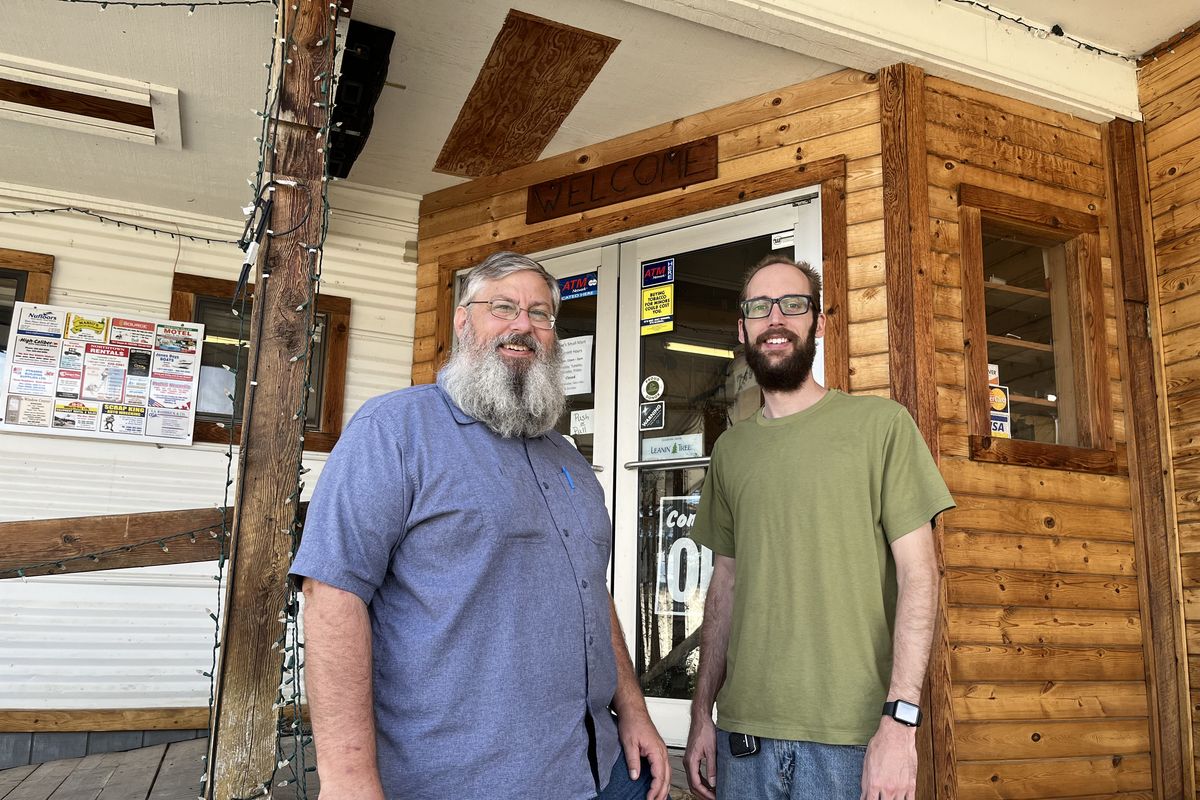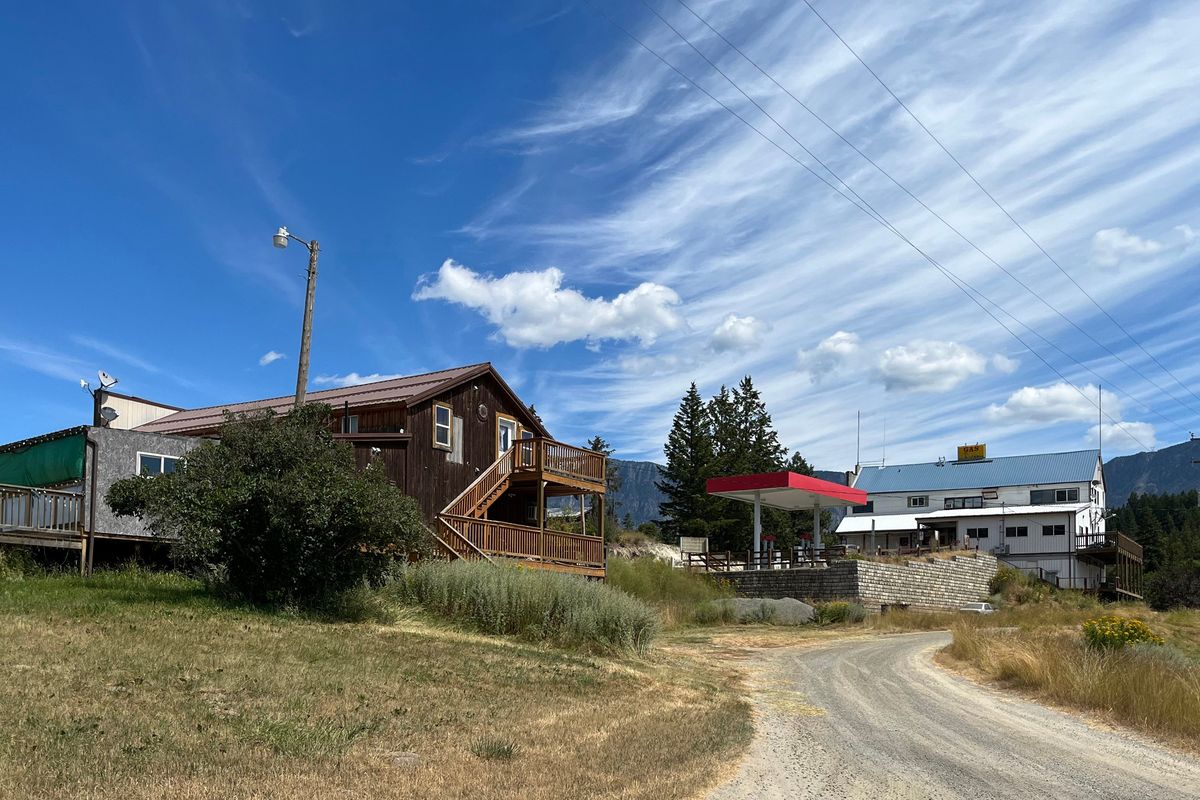‘Doubly desperate’: Despite border reopening, North Idaho family struggles to prosper after business drops to 30% of what it was before pandemic

PORTHILL, Idaho – One day last week, a small group of motorcyclists grabbed some snacks and a drink for the road at Jake’s Landing.
Porthill is the end of the road for motorcyclists traveling through Idaho on the state’s backcountry discover route, an off-road trail that starts in Jarbridge, Nevada, and ends at the Canadian border.
As the only gas station, convenience store and shipping depot at the top of the state, Jake’s Landing sees a half dozen motorcyclists finishing up their ride a week.
A year ago, Jake’s Landing would maybe see five or six customers a day. Now, the store sees between 15 and 20 customers every day – still much slower than it was before the COVID-19 pandemic when the border shutdown and the business lost almost 95% of its customers. The border has since reopened, but some restrictions are still in place, and many businesses have yet to recover.
Jake’s Landing in Porthill, Idaho, sits right past the U.S.-Canada border. (Spokesman-Review photo archives)
The motorcyclists checked out with Landen Jacobson, the son of owner Lars Jacobson, who has helped manage the store since the shutdown more than two years ago. For much of the time, no one in the Jacobson family received a paycheck.
“Appreciate it, thanks!” one of the motorcyclists said.
“Safe travels, guys!” Lars Jacobson responded.
‘Crack’ in border opens but still not back to normal
Like many along the U.S.-Canadian border, the Jacobsons’ businesses completely changed when the COVID-19 pandemic closed crossings between the countries.
Two and a half years later, the border is reopened, but with some restrictions still in place, businesses like Jake’s Landing are still losing money every month.
And they don’t know when relief will come.
Before the pandemic, Jake’s Landing – a convenience store, gas station and shipping depot located 500 feet south of the Canadian border – was often packed with Canadians who would cross the border for quick trips for cheap gas, food and package delivery.
After 19 months, the border reopened in November to fully vaccinated travelers going between the U.S. and Canada. To enter either country, a traveler must be fully vaccinated and have appropriate travel documents.
Canada dropped its testing requirement in April but kept requirements that travelers use ArriveCAN, an app that can be used to submit travel and vaccination documents. Failing to use ArriveCAN to submit travel information and proof of vaccination can result in a $5,000 fine, according to the Canadian government travel guidelines.
Setting up ArriveCAN can be a hassle for those who want to make a short trip and difficult for older people or those not comfortable with technology, Jacobson said. Because of the restrictions, their business remains at 25% to 30% of where it was before the pandemic.
“The border opened, but it’s not really opened,” Jacobson said. ”It’s more of just a crack.”
Businesses across the country are slowly recovering from the border closure.
The Black Ball ferry line, which travels between Port Angeles, Washington, and Victoria, British Columbia, has four sailings a day. That’s up from two at the end of 2021 and no sailings for the majority of the early pandemic. Tourist destinations like Point Roberts – a small Washington town surrounded by water on three sides and the Canadian border on one – have seen an uptick in visitors, but still not as high as a normal summer .
Border crossings are still well below where they were before the pandemic.
In June 2019, the Porthill border crossing saw more than 32,000 travelers. This June , that number was less than 10,000.
Numbers at even the busiest crossings, like Washington’s Blaine crossing at Peace Arch State Park, are well below prepandemic levels. In June 2019, more than 1.1 million travelers crossed the border at Blaine. In June , that number was down to almost 660,000.
Jake’s Landing has expanded hours since the border reopened to four days a week for half of the day, but it still cannot open every day full time. The convenience store that was once fully stocked with beer, cheese and travel essentials is often sparsely filled with grocery items that Jacobson can find on sale at stores in town.
Canadians will often order from somewhere in the United States, like Amazon, and ship to Jake’s Landing to avoid expensive shipping fees.
The package depot once saw 200 packages a day. Now, it gets somewhere between 50 and 80 packages, but still customers don’t always come in right away to pick them up. There still are more than 1,000 packages left over from before the border shutdown.
“People just haven’t come back for them,” Jacobson said.
And they have no idea when or if they will.
Difficult restrictions slow crossingsWendy Jacobson has lost count of the number of people who come into the store asking for help with the ArriveCAN system, but it’s probably about a half dozen every week.
Canadian border officials at the Porthill crossing will often tell travelers who are trying to cross but don’t have the app set up to go back to Jake’s Landing and they will help get them set up, Lars Jacobson said. Even if a traveler has every document they need printed and ready to show border officials, they will be turned away if they do not have ArriveCAN set up.
One elderly couple came in last week and asked Wendy Jacobson to set up the entire app for them. She took their travel and vaccine information and inputted it into their phone because it was too confusing for them.
Most of the people they help are Americans who didn’t know they needed ArriveCAN to cross or elderly people who either don’t have smartphones are aren’t as comfortable using them, Lars Jacobson said.
“That is a hindrance to people just swinging down,” he said.
The Canadian government shows no signs of removing the ArriveCAN requirement, despite concerns from travelers, businesses and experts, as well as a glitch in the app last month that incorrectly told a number of travelers that they had to quarantine.
Some of their old customers can’t come down because they are not vaccinated against COVID-19. Some are vaccinated and have the right paperwork but are unsure of how to use ArriveCAN. Others are just cautious, having faced so much uncertainty when crossing the border during the pandemic.
For some, the times that the Porthill crossing is open also dissuades them from crossing, Lars Jacobson said.
The crossing is only open from 7 a.m. to 5 p.m. Before the pandemic, it was open from 7 a.m. until 11 p.m. Many people who may want to come down after work can’t do so with those hours, Lars Jacobson said.
To offset some of the costs, Jake’s Landing has started hosting other events, like an annual Christmas celebration or selling smoked meat tacos at the county fair. The Jacobsons turned some of their land by the Kootenay River into campsites. They are in the process of converting the apartment above the restaurant into an Airbnb.
But none of that may be enough if their business does not pick up, Lars Jacobson said.
The business had received some small federal loans for small businesses in the beginning of the pandemic, but trying to get a second supplemental loan proved difficult, he said.
According to the U.S. Small Business Administration, the federal government gave out more than 12,900 COVID-19 economic injury disaster loans for a total of more than $1 billion to small businesses in Idaho in 2021 – the year the Jacobsons started applying.
But after more than a year of applying and hearing nothing, Lars Jacobson said it was obvious that they wouldn’t get anything despite being “devastated” by the COVID-19 pandemic.
“As desperate as we ever had been, we are doubly desperate now,” he said.
Staying open for now but ‘cliff is out there’Buying Jake’s Landing in 2019 wasn’t just a thought for the Jacobson family of 10.
Lars Jacobson said he believes God told the family to buy the land. It was a personal experience, he said, and his motivation to stay open all this time is a spiritual one.
“And I don’t know what his plan is,” he said. “But I’m going to work my hardest until my dying breath or until I literally don’t have two pennies to rub together,” he said.
If they don’t make it, he said, it will be like starting from scratch, from when he graduated college and had nothing.
“The cliff’s out there,” Lars Jacobson said. “I just don’t know where it is.”
But he knows customers still appreciate Jake’s Landing staying open. Some customers still come in for the first time since the border first closed about 2½ years ago.
“Oh, I haven’t been here in forever,” they say.
“Welcome back!” Wendy Jacobson says.
“Thank you for still being here.”



